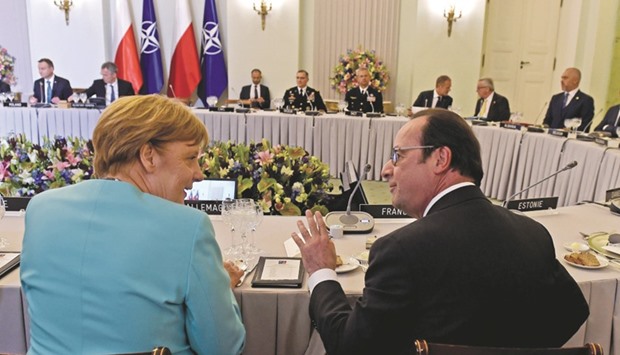Nato leaders yesterday agreed to deploy military forces to the Baltic states and eastern Poland for the first time and increase air and sea patrols to reassure allies who were once part of the Soviet bloc following Russia’s seizure of Crimea from Ukraine.
The 28-nation Western defence alliance decided to move four battalions totalling 3,000 to 4,000 troops into northeastern Europe on a rotating basis to display its readiness to defend eastern members against any Russian aggression.
However, they also underlined their willingness to pursue a dialogue with Moscow and revive confidence-building measures that Russia has spurned since its 2014 annexation of Crimea and support for Russian-speaking rebels in eastern Ukraine.
“These battalions will be robust and they will be multinational. They make clear that an attack on one ally will be considered an attack on the whole alliance,” Nato secretary-general Jens Stoltenberg told a news conference after the summit’s first working session in Warsaw, the Polish capital.
President Barack Obama said the United States would deploy about 1,000 soldiers in Poland under the plan “to enhance our forward presence in central and eastern Europe”.
Germany will lead the battalion in Lithuania, Britain in Estonia and Canada in Latvia. Other nations such as France will supply troops.
Obama said earlier that Britain’s referendum vote to leave the European Union, an outcome he sought to avoid, should not weaken the Western alliance but raised “significant questions” about the future of European integration. America’s “special relationship” with the UK would survive, the president said.
Host nation Poland set a tone of mistrust of Russian intentions. Foreign Minister Witold Waszczykowski told a pre-summit forum: “We have to reject any type of wishful thinking with regard to pragmatic co-operation with Russia as long as it keeps on invading its neighbours.”
Obama was more diplomatic, calling for dialogue with Russia, but he too urged allies to keep sanctions on Moscow in place until it fully complies with a ceasefire agreement in Ukraine.
German Chancellor Angela Merkel said that while Nato was increasing its defence capabilities, it was always keen for dialogue with Moscow.
A planned meeting of the long frozen Nato-Russia Council next week would address ways to avoid dangerous situations in Baltic air space, she said.

German Chancellor Angela Merkel and French President Francois Hollande chat during a working dinner at the Presidential Palace in Warsaw yesterday.
